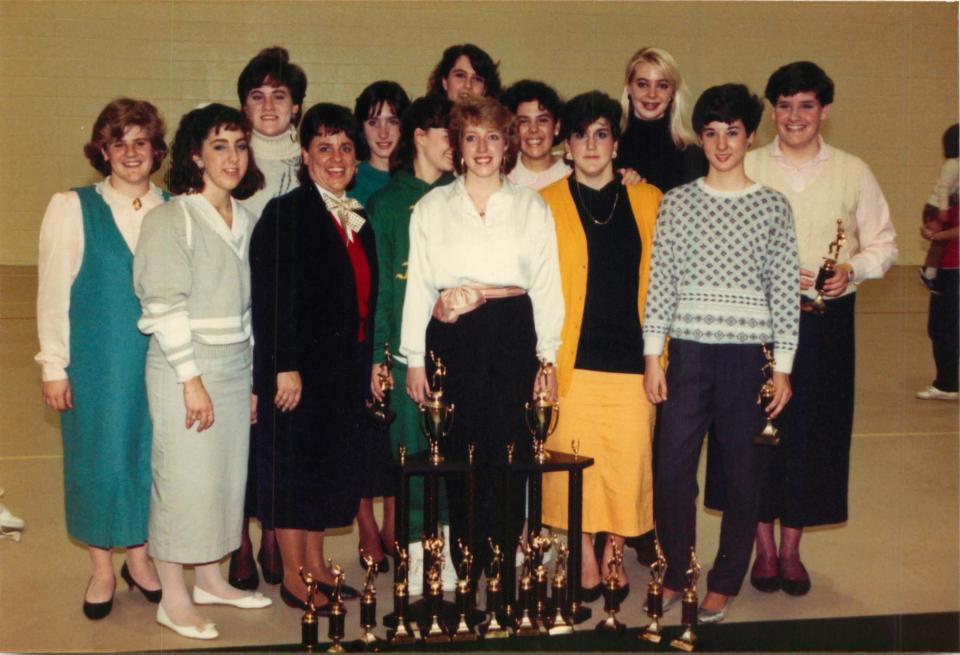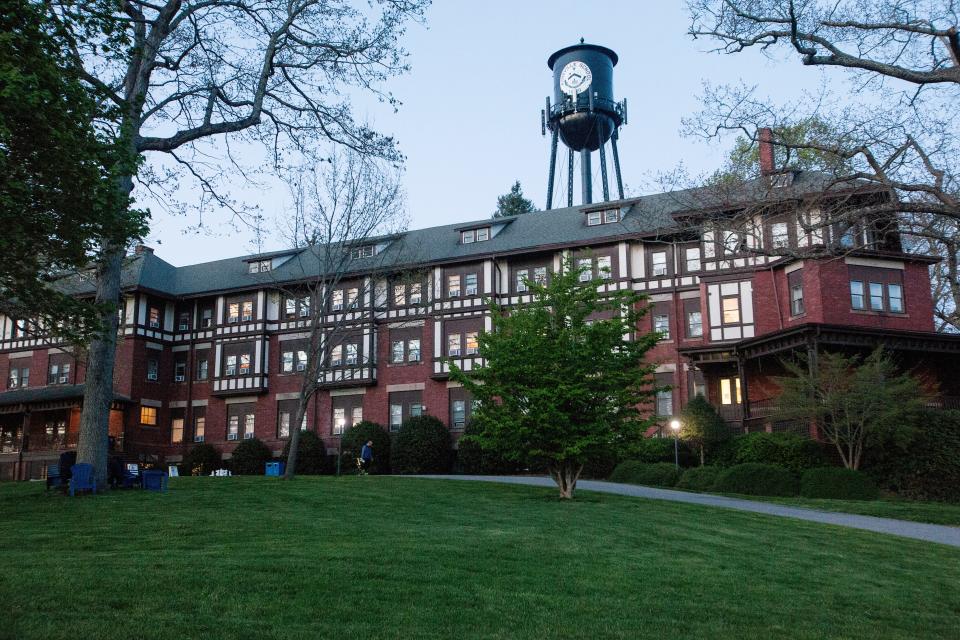Adult victim wins $1M against child sex abuser, coach at former Asheville Christian school
In a victory for adult victims of child sexual abuse, a North Carolina Appeals Court has ruled that a section of the N.C. SAFE Child Act that opened a two-year “lookback window” to sue for monetary damages is indeed constitutional.
The Gaston County case ― as well as a recent federal court ruling granting a victim more than $1 million in damages in a case brought under the SAFE Child Act — should have far-reaching implications for other pending Asheville child sexual abuse cases, including lawsuits against Asheville School.
On Sept. 12 in a divided 2-1 decision in McKinney v. Goins and Gaston County Board of Education, the three-judge panel reversed a 2021 ruling by a lower court that found the 2019 law extending the statute of limitations by two years for adults to bring civil claims for child sexual abuse was unconstitutional.
The case involves three former Gaston County students who are suing Gary Scott Goins - a former East Gaston wrestling coach who was convicted of sexually abusing team members and is now serving a 34-year prison sentence - and the Gaston County school board, for abuse they suffered in the mid-1990s and early 2000s as pre-teens and teens.
The school board, Goins’ employer, received numerous complaints concerning his physical abuse of student wrestlers. “The Board, however, made no corrective action in response to these reports, electing instead to dismiss them after minimal investigation,” the ruling stated.
Before the SAFE Child Act, child abuse victims only had until age 21 to file lawsuits against individuals or the institutions. A portion of the law allowed adult victims of child sexual abuse, 21 or older, to file suits between Jan. 1, 2020 and Dec. 31, 2021. During that time, according to legal experts, hundreds – if not thousands – of lawsuits were filed across North Carolina against individuals, including teachers, clergy and scout leaders, as well as schools, camps, churches and institutions like Boy Scouts of America.
The SAFE Child Act, which contains other provisions including mandatory reporting to police by adults who witness or suspect violence against children, was passed unanimously in 2019 by a Republican-controlled General Assembly. Under the law, victims now have until age 28 to file civil suits for abuse that occurred before they were 18.
Don Higley, an Asheville attorney with Lanier Law Group, P.A., representing the McKinney case plaintiffs, said the case will automatically go to the N.C. Supreme Court because the decision was split 2-1. Had it been 3-0, an appeal to the state’s highest court would have been more difficult, he said.
“I do think that we are correct. Constitutionally, the legislature was well within their rights to draft and pass that legislation,” Higley said of the ruling.
“I think that the counter argument that once the statute of limitations had run out, they had a core constitutional right ― meaning like the right to vote ― to be free from liability, just doesn't make any logical sense. The legislature is free to allow these victims a chance to file their lawsuit even though the statute of limitations had run.”
What the judges said
In 2021 the three-judge Wake County panel had dismissed the McKinney lawsuit, in which Attorney General Josh Stein's office had filed an amicus brief on behalf of the plaintiffs.
But in her majority opinion, Court of Appeals Judge Allison Riggs, who was just seated this week by Gov. Roy Cooper on the N.C. Supreme Court, wrote that the panel erred.
“Because adopting the Board’s position would require us to strike down as unconstitutional a duly enacted statute of our General Assembly and disregard the narrowly crafted legislation designed to address a stunningly pressing problem affecting vulnerable children across the state, we decline to convert an affirmative defense into a free pass for those who engaged in and covered up atrocious child sexual abuse,” Riggs wrote.
Court of Appeals Judge Fred Gore agreed.
Judge Jeff Carpenter wrote the dissenting opinion saying the majority was overruling the results of several binding legal cases from the Court of Appeals, as well as a 1933 state Supreme Court decision.
“I completely agree: Sexual abuse of children is vile. I agree that striking down legislation as facially unconstitutional is strong medicine, only suitable for clear constitutional violations,” Carpenter wrote, but “the stability and predictability of our justice system requires that we adhere to the precedents" of the appellate courts.
The state intervened in the lawsuit, with lawyers under Attorney General Josh Stein defending the law. Stein said Sept 13 he was pleased with the Sept. 12 decision, saying “this ability to hold accountable abusers is critical to helping people process traumatic child abuse and recover.”
$1 million ruling
Rachel Howald, a survivor of child sexual abuse at the hands of a teacher and coach at a former Asheville Christian-based high school, won more than $1 million in compensatory and punitive damages in a civil case against that staffer in what might be the first case successfully brought under the lookback window clause of the N.C. SAFE Child Act, according to legal experts.
Howald, now 52 and living in New York, sued Pamela K. Herrington in January 2021 for sexual abusing her in the 1980s while Howald was 16 and 17 years old. She also sued the Ben Lippen School, once located in West Asheville, for allowing Herrington multiple opportunities to victimize her. The school, now based in South Carolina, settled with Howald in June 2022 under sealed terms.
Successful suit: Child sexual abuse lawsuit under NC SAFE Child Act settled against former Asheville school
In October 2022, U.S. District Judge Martin Reidinger for the Western District of North Carolina, issued a summary judgment against Herrington, now in her 70s and living in Texas, finding her liable for assault, battery, false imprisonment and intentional infliction of emotional distress. In court depositions Herrington acknowledged the abuse.
In February, Reidinger issued a final judgment against Herrington for compensatory and punitive damages of just under $1.2 million.
“I hope the outcome of my case gives tremendous hope to other survivors of child sexual abuse that the courts are indeed listening and our voices are finally being heard — even if it takes 35 years,” Howald wrote in an email to the Citizen Times.

The abuse caused Howald lifelong emotional trauma and a diagnosis of PTSD, the final judgment reads, causing Howald to spend thousands on therapy and a range of therapy techniques and medication.
Howald’s attorneys, John Riordan and Jonathan Shbeeb with Charlotte-based Fidelity Law Group, hailed her as a “hero” for her bravery and perseverance in the case, which began years before the lawsuit when Howald filed a report against Herrington with the Asheville Police Department.
Although there was an investigation, Herrington was never criminally charged due to the statute of limitations.
According to court documents, Herrington asked for her attorney to be withdrawn from her case. Herrington could not be reached for this story.
“Rachel is an inspiration to me and to all of us to push through all of this after experiencing the pain she suffered over the years,” Shbeeb told the Citizen Times. “We want to protect victims, but we want to give them justice. Rachel is at the forefront of this. She's spearheading this.”
And Howald’s win should put other defendants on notice, he said, referring to the many cases that are currently stayed.
“We have a record award for victims. I think that that puts pressure on every defendant out there, seeing how potential cases could go. Granted, this is summary judgment and not a jury. But a judge agreed with us,” Shbeeb said.
Status of Asheville School sexual abuse cases
Howald's settlements, and the McKinney case and Cohane v. Glenmary Home Missioners ― another appellate court case decided Sept. 12 that reversed a lower court opinion in favor of an adult victim who filed under the SAFE Child Act ― together are a welcome step forward for the many other child sexual abuse civil cases across North Carolina that have been on hold pending the Appeals Court decision.
Amanda Mingo, an attorney with Charlotte-based Rawls, Scheer, Clary & Mingo PLLC, represents five plaintiffs in four lawsuits filed against Asheville School claiming sexual abuse by teachers at the private boarding high school in the 1960s, ‘70s and ‘90s who filed civil claims under the lookback window of the SAFE Child Act.
Walter Triplette, who was a student at the elite and expensive school in West Asheville between 1965-70, claimed he was sexually abused by two different teachers there, Richard P. Woodhouse, who was a Spanish teacher, and William Crutchfield, a math teacher who has since died. Triplette was the first alumnus of the school in its more than 100-year history to file a sexual abuse lawsuit, which he did in December 2020.
More: 5th sexual abuse lawsuit filed against Asheville School; former teacher says he's innocent
More: Child sexual abuse lawsuit under NC SAFE Child Act settled against former Asheville school

“The Asheville school cases continue to be stayed. The defendants in McKinney and Cohane have 15 days to appeal once the mandate is issued from the Court of Appeals to the trial courts. They have an automatic right to appeal the decisions, and it is likely the Asheville School cases will be stayed until a final decision is entered,” Mingo told the Citizen Times.
The Citizen Times reached out Sept. 14 to the attorneys for defendants Gary Scott Goins and the Gaston County Board of Education but did not immediately receive a response.
Mingo said the Gaston case is likely to go to the N.C. Supreme Court, but there is no way to tell how long it would take to be heard and decided.
“The plaintiffs in these cases have lived with this for their entire adult lives. The delays involved in challenging the statute only benefits the defendants. Ultimately, for the plaintiffs in these cases, justice is already overdue, so resolution sooner rather than later is warranted,” she said.
More: More allegations of sexual assault at Asheville School emerge: police reports
More: More Asheville School alumni claim sexual abuse as SBI investigation enters 2nd year
Karen Chávez is Executive Editor for the Asheville Citizen Times, part of the USA TODAY Network. Tips, comments, questions? Call 828-236-8980, email, KChavez@CitizenTimes.com or follow on Twitter @KarenChavezACT.
This article originally appeared on Asheville Citizen Times: NC law allowing adult victims of child sex crimes to sue upheld
